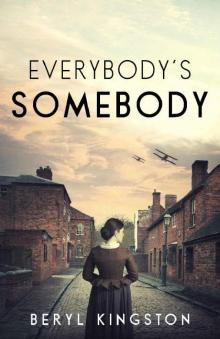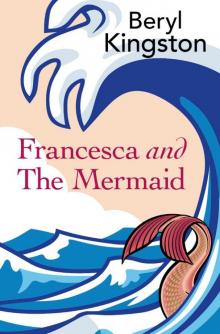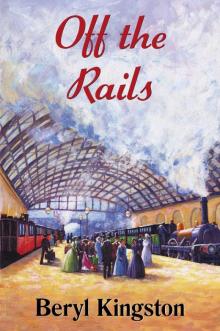- Home
- Beryl Kingston
Gemma's Journey Page 2
Gemma's Journey Read online
Page 2
Andrew could see their casualty. She was lying right underneath the concertinaed bulk of the second carriage with the wheels and bogey within inches of her face, a small slight girl, pale with shock and covered in filth, her face laced with blood, her dark hair matted, obviously badly injured. Her quietness and patience were enough to tell him that. She’s been a pretty girl, he thought as they passed her, and he wondered how on earth they were going to get her out, poor kid.
Gemma had lain in the heat and stink of her metal prison for such a long time that her senses were dulled to it. She’d given up trying to struggle free, accepting that she was too tightly trapped and that the slightest attempt to move brought more pain than she could bear. She knew it was still daylight because she could see glimpses of sky somewhere beyond her, but her awareness of time and place had seeped away along with her energy. Now there was nothing in her world except the terrible looming mass of the coach crushed above her – and pain. While it was just an aching pulse she could endure it and hang on to be rescued, but when it hammered into full, sickening strength, she was mortally afraid and groaned against the agony of it. By the time someone began to wrench away the remains of her coach, she was too exhausted to call out, even though they were within inches of her head. They’d come to rescue her and that was all she needed to know.
Presently she became aware that a young face was looming towards her. She had an impression of strength and determination, caught a glimpse of thick dark hair, very blue eyes, a stubborn mouth. ‘Don’t worry,’ the mouth said. ‘You’re going to be all right. We’re here.’
She tried to swallow so that she could answer him but he was putting a needle into her arm. ‘Am I – going – to die?’ she asked.
‘Good God no,’ he said. ‘Of course not. I never let any of my patients die. I’ll just get this drip set up and then I’ll give you something for the pain.’
He was so sure of himself that Gemma was reassured. Perhaps she was going to survive after all. She waited until he’d finished with her arm. ‘Are you going – to get me out?’
‘Of course,’ he said. ‘But we’re going to make you comfortable first. What’s your name?’
She told him in what little voice she could muster and submitted gratefully to the needle that would ‘soon take the pain away.’ Then she closed her eyes in weariness as he began to examine her.
Now that he was face to face with his first casualty, Nick was in total control and professionally calm, despite the instant rush of adrenalin that had filled him with excitement as soon as he arrived and given him the usual pleasurable sense of importance. He worked automatically, checked her pulse and blood pressure, which were very poor, as he expected, estimated the extent of the injuries he could see. There was a deep gash behind her right ear, but her air passages were clear and there were no other serious injuries to her head, chest and arms apart from superficial cuts and bruises. But she’d lost a great deal of blood and was obviously trapped by the legs, so he knew there would be serious injuries further down her body.
‘There’s – a little boy – on the other side,’ she said, raising her hand vaguely towards the squashed bulk of the carriage above her and opening her eyes again. ‘We’ve been – talking. I haven’t – heard him – for ages.’
‘Yes,’ he said, dismissively. ‘We know about him. They’re getting him out now.’
‘Is he – all right?’
‘Of course,’ he said, thinking what courage she had. Fancy being concerned about someone else when you’re lying underneath a wrecked train. ‘I told you. We’re here now.’
She saw that he was moving away from her. ‘You’re not going?’ she begged.
‘No,’ he said. And when she looked an anxious question at him, ‘I’m going to squeeze in and check over the rest of you. Sally here’s going to put a temporary dressing on your head. All right?’
Gemma didn’t look to see who Sally was. Now that the pain had receded she was so weary that her eyes were closing of their own accord. She was aware that a pad was being put on her forehead and that the doctor was wriggling in alongside her underneath the bogey. If it falls now, she thought, it will squash us both. But she couldn’t imagine it falling on this young man. He was too full of confidence for that.
As he switched on the light on his helmet and inched into the dark and filth under the bogey, Nick knew it would be a hard job to examine his patient. There was so little room between the crushed seats of the first coach and the overhanging bogey of the second. He removed a chunk of bloodstained seating and passed it out to one of the firemen, then a crushed attaché case and various other bits of smashed luggage and torn clothing, shiny with blood, then more seating, but there was still far too little space. He eased his scissors from his jacket and began to cut away the girl’s blood-soaked jeans, passing the material out in the same way.
Once he’d hacked off her boot, he could see that the girl’s right foot was broken and swollen and the leg above it was badly lacerated. Both looked dreadful but the bleeding wasn’t excessive and they were injuries that could be dealt with. It was the other limb that was causing the bleeding and that was a horror. Her left foot and part of her lower leg were crushed under the edge of the bogey. He knew at once that it was much too badly injured to be saved. So much blood had pumped from her wounds that the entire area was sticky with it and he could see that the bones were splintered and that her flesh was dark and torn. For a few appalled seconds he felt such a rush of pity for her that he was dizzied by it and couldn’t go on. No wonder she was in pain. To be crushed like this, trapped like this. And lying there so patiently, waiting to be rescued. What courage! Then he gathered his senses and started to deal with the bleeding. She was in a very bad way but he wasn’t going to let her die – not if he had anything to do with it.
‘Well?’ Mr Barnaby asked, when he’d wriggled out into the air again. He and Andrew had finished their inspection on the other side of the carriage and were worried by what they’d found.
Nick gave his report. His clothes were covered in blood and his hands and face smeared with grease, but he was splendidly professional.
Mr Barnaby was thinking. ‘That’s a pig,’ he said. ‘But I suppose we had to expect it.’ He turned to the fire chief who was standing at his elbow. ‘You’re sure you can’t cut through the bogey from the other side?’
‘No,’ the fire chief said. ‘It’s too risky. You can see the angle it’s at. It’ll have to be lifted, like I told you.’
‘So we’ve either got to wait for that damned crane,’ Mr Barnaby said. ‘Or we’ve got to amputate the leg.’
‘We radioed in when we got here,’ the fire chief told him. ‘It’s on its way.’
‘How long?’
‘Another ten minutes, I should say. Shouldn’t be long now. Then half an hour. Hour at the outside.’
‘Too long,’ Mr Barnaby said. ‘What do you think, Drew?’
‘I don’t think we’ve got a choice,’ Andrew answered sombrely. ‘We’ll have to amputate.’
‘How much room have we got in there?’ Mr Barnaby wanted to know.
‘Very little,’ Nick told him.
‘Ah well. Let’s get on with it.’
‘Right,’ Nick said. ‘I’ll get things organised.’ And he went off to tell the rest of the team.
Gemma was so quiet and peaceful she looked as though she was asleep. ‘Yes?’ she said, when Andrew began to prepare her for the anaesthetic.
‘I’m afraid your leg is very badly injured,’ he told her.
She was very calm. ‘Yes,’ she said. ‘I thought it was.’
There was no time to break it to her gradually. ‘I’m afraid you’re going to lose it.’
She took that calmly too. Her courage was very impressive. ‘You’re going to cut it off,’ she said. It was a statement not a question.
‘Yes.’
She sighed and closed her eyes. ‘Can’t you do anything else?’
‘I’m afraid no
t,’ he said gently. ‘It’s the only way to get you out.’
‘Can’t they cut me out?’ she begged. But the expression on her face revealed that she understood what a vain hope it was.
He gave her an honest answer, estimating that she was tough enough to take it. ‘No. I’m sorry my dear, but it wouldn’t make any difference if they could. Your leg is too badly injured to be saved.’
He expected her to weep or argue or rage. But she didn’t. She digested what he’d said, her eyes closed. When she opened them, the strain on her face was plain for all her rescuers to see. Sally, the nurse who’d put the dressing on her head wound, was so close to tears that she had to turn her head away. And the firemen were grim-faced. ‘Then you’ll have to do it, I suppose.’
‘Yes. You won’t feel anything. I’m going to give you an anaesthetic.’
‘You will be able to get me out of here?’
‘Yes. We will. The sooner we can get you to theatre the better.’
She gave him a wry smile, her eyes full of distress. ‘That’s where I was going,’ she remembered, as he prepared the first injection. ‘To a theatre.’
‘Were you?’ Andrew said, bending towards her as he made professional conversation. ‘Why was that then?’
‘I was going to an audition. For a part in a play.’
‘Ah! You’re an actress?’
‘Yes.’
‘Can you count to ten for me?’
She began to count, patiently obedient. ‘One, two, thr …’
She was out but he smoothed her hair and praised her as though she could hear him. ‘You’re a good brave girl,’ he said.
It took a long time for Nick and Mr Barnaby to amputate her leg and even longer to inch her unconscious body gradually and carefully from beneath the bogey and on to its waiting stretcher, even though there was a gang of firemen and paramedics to help them do it. As she was carried to the ambulance, wrapped and strapped, with a drip held above her bandaged head and a cradle humped over her severed leg, the rescue teams gave her a cheer.
Mr Barnaby was pale from the stress of the operation but Nick was looking pleased with himself.
‘That was a job well done,’ he told his father.
You’re so young and so conceited, Andrew thought. ‘This is just the beginning,’ he warned. ‘She’ll need careful nursing. There’s always the chance of a wound infection in an accident like this.’
Nick smiled the idea aside. ‘Not the way we work nowadays,’ he said, and teased, ‘you’re being old-fashioned.’
Andrew didn’t argue with him. This was neither the time nor the place. ‘Let’s hope so,’ he said drily and followed Mr Barnaby to their next casualty.
It was well into the evening before the last injured person had been ferried away to hospital and the last mangled body withdrawn from the wreckage and certified dead. By then the rescue teams were so numb with the accumulated horror of what they’d seen that they were beyond speech.
Andrew stayed on the tracks after the last ambulance had gone to give himself a chance to recover a little before he drove home. He took out his handkerchief to wipe the worst of the dirt from his face. To right and left, the sky above the common was the rich blue of twilight, and the roofs and chimneys below it were a lilac outline where the street lights shone like strings of amber beads. It looked peaceful and romantic and impossibly distant against the terrible reality of the crashed coaches and the arc lights that blazed above the debris. Their artificial light was so strong that it cast the landscape immediately behind them into total darkness and lit up the luminescent coats of the departing rescue teams as though they were actors on some surreal film set. To Andrew’s exhausted eyes, they made the scene bizarre, diminishing it, as if the pain he’d been witnessing all afternoon had been set up as an entertainment.
And to add to the impression, the TV crews had arrived. He’d been vaguely aware of them while he’d been working, but he’d been too busy to take much notice of them. Now he could see three from where he stood and one was endeavouring to interview John Barnaby who was striding off towards his car with Nick behind him.
‘No,’ Andrew heard his old friend say. ‘I can’t. Not now.’
Quite right, Andrew thought, but then he realised that the young man was heading his way, the fluffy sausage of the microphone borne before him like a Roman standard. ‘Excuse me, sir. Could you give us a few words? Your reaction.’
Anger rose in Andrew Quennell. Bloody, intrusive monsters, he thought, poking their damned cameras in. Can’t they see they’re not wanted? Blowflies, the lot of them, rushing in to find the corpses. And anger brought a flow of language as it always did with him. All right then, he thought. I’ll give you a few words and see how you like them. ‘It’s a total, God-awful waste,’ he said. ‘It should have been prevented.’
His outspokenness was just what the presenter wanted. The camera was turned in his direction at once.
‘Are you saying,’ the presenter prodded to open the interview, ‘that this accident was avoidable?’
‘Oh for God’s sake, of course it was avoidable,’ Andrew told him angrily. ‘Accidents don’t just happen. They’re caused.’
‘Human error?’ the presenter suggested.
‘That’s glib,’ Andrew said. ‘That’s what politicians say. Human error. Can’t be helped. These things happen. All very cosy. Lets everybody off the hook. Then we can all go away and forget about it.’
‘So you don’t think this was human error?’
‘I’ve treated hundreds of accidents in my time,’ Andrew said. ‘Every single one was caused. By fatigue, poverty, carelessness, hyperactivity, you name it. Most could have been prevented. The ones caused by fatigue certainly could have been. We know how dangerous fatigue is. We know how it’s caused. A driver works excessive hours, he’s dangerous. Right? A man under stress is at risk. He puts everyone around him at risk. Right? Accidents are caused. And I’ll tell you something else. You don’t have to look far to find the root cause of most of today’s accidents.’
‘Which is?’
‘Greed.’
That wasn’t what the presenter expected. ‘Greed?’
‘Take a look at this rolling stock,’ Andrew said, gesturing towards it. He looked magnificent in that harsh light, his face passionate, grey eyes gleaming, chin determined, brow and cheekbones strongly defined, thick hair blazing like a silver halo. ‘It’s twenty years old if it’s a day. That’s dangerously old. It should have been replaced years ago. But no. It’s still in use. It should have been very carefully maintained. The older vehicles are, the more maintenance they need. Any fool knows that. But has it been? Look at it. Greed.’
‘Are you saying that this accident was due to poor maintenance?’
Andrew was into his stride and too angry to be cautious. ‘I’d lay money it was,’ he said. ‘It’s not vandalism. There’s no sign of that. So it’s either badly maintained signals, or rotten cables that should have been replaced, or dangerously outmoded rolling stock, or a driver working when he should have been resting. We live in penny-pinching times. British Rail is being privatised. So we don’t spend taxpayers’ money on rolling stock, or safety measures, as we ought to if we had any sense. We use it to bribe the buyers. We use it to ensure a good profit for the shareholders. Profit. That’s what this is about. If this accident turns out to be the result of poor maintenance, or the lack of proper investment, I hope no one will forget that the casualties will have paid the price for it.
‘We’ve just had to amputate the lower leg of a young actress who was on her way to an audition, at the very start of her career. She was incredibly brave. Incredibly brave. Her bravery ought to put the profit-makers to shame. But I doubt if it will. Their greed ought to be revealed for the selfishness it is. But I doubt if that will either. We value money more highly than human life, that’s the message of this accident. It’s a very sick world.’
‘Well thank you, Doctor,’ the presenter said, wrapping it
up. ‘If we can just take your name for the caption.’
‘Ye gods!’ the cameraman said as they sped off to find another talking head.
‘Tell it like it is!’ the presenter grinned. ‘That’ll rattle a few cages. How did it look?’
‘Great. He’s got a good face. The hair was magic.’
‘Thought so. You can’t beat a man who knows his mind.’
‘If they run it,’ the cameraman said.
The presenter had no doubt about it. ‘They’ll run it,’ he said. ‘He’s a natural. Never seen anyone so sure of himself.’
At that moment, the natural was sitting in his car, feeling peculiarly unsure of himself. The interview had been so quick and so full of fury that now he couldn’t remember half of what he’d said. What if he’d gone too far? Said too much. It wouldn’t be the first time. He’d lost count of the number of occasions he’d wrecked a situation by saying too much. Especially when he was young.
He picked up his mobile phone and dialled home, persuading himself that he ought to warn Catherine that he was on his way, but actually yearning for the reassurance of her voice. But the line was engaged. Ah well, he thought, switching on lights and ignition, it’s too late for anyone to do anything about it now. What’s said is said. At least they can’t sack me, not when I’ve just asked for early retirement. As he inched into the oncoming traffic, he comforted himself with the thought that, angry or not, everything he’d said was true. In any case, they might not run it.
Chapter 3
When the phone rang that evening, Catherine Quennell put down the onion she was peeling and answered it at once. She knew it would be Drew because he always called her on his way home from an accident. He said it was his first step back into the normal world and, after a lifetime in nursing and more medical emergencies than she could count, she knew how important that was. She was skilled in the art of easing him back from the horrors. Everything was ready, whisky and soda waiting on the sideboard, bath towel heating on the rail, clean clothes laid out on the bed. When the phone interrupted her, she’d been preparing a vegetable soup for their evening meal because that might be all he could eat if the crash had been a bad one.

 Everybody's Somebody
Everybody's Somebody Sixpenny Stalls
Sixpenny Stalls Francesca and the Mermaid
Francesca and the Mermaid Avalanche of Daisies
Avalanche of Daisies Tuppenny Times
Tuppenny Times A Time to Love
A Time to Love Octavia's War
Octavia's War Gemma's Journey
Gemma's Journey London Pride
London Pride Gates of Paradise
Gates of Paradise Octavia
Octavia Off the Rails
Off the Rails Maggie's Boy
Maggie's Boy Fourpenny Flyer
Fourpenny Flyer